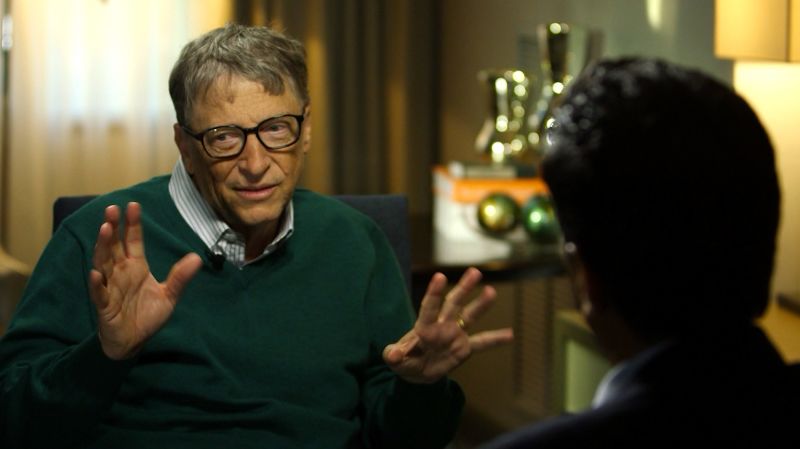Bill Gates’ Philanthropic Efforts
Bill Gates, the co-founder of Microsoft, has been a prominent figure in philanthropy for decades. His commitment to improving global health through his charitable endeavors has had a significant impact on countless lives.
Global Health Initiatives
Gates’ philanthropic journey began in the early 1990s when he and his wife, Melinda French Gates, established the William H. Gates Foundation. Initially focused on improving education in the United States, the foundation’s focus shifted to global health issues in the late 1990s. The Gates Foundation’s mission is to enhance healthcare outcomes and reduce poverty around the world.
Investments in Healthcare Research and Development
The Gates Foundation has invested billions of dollars in research and development of vaccines, drugs, and other healthcare interventions for diseases like malaria, HIV/AIDS, and tuberculosis. These investments have led to significant advancements in the fight against these diseases.
Tackling Major Global Health Challenges
The Gates Foundation has been instrumental in tackling some of the world’s most pressing health challenges. Its work includes:
- Reducing child mortality: The foundation has supported programs that have led to a significant decline in child mortality rates in developing countries. This includes providing access to vaccines, improved sanitation, and better nutrition.
- Fighting infectious diseases: The foundation has invested heavily in research and development of vaccines and treatments for infectious diseases like malaria, HIV/AIDS, and tuberculosis. These efforts have resulted in significant progress in controlling these diseases.
- Improving family planning: The foundation has supported programs that provide access to family planning services, empowering women to make informed choices about their reproductive health.
- Promoting agricultural development: The foundation has invested in agricultural research and development to improve food security and nutrition in developing countries.
The Alzheimer’s Disease Crisis
Alzheimer’s disease, a devastating neurodegenerative disorder, poses a growing global health crisis. It is characterized by the progressive decline of cognitive function, memory loss, and behavioral changes, leading to significant personal, familial, and societal burdens.
The Current State of Alzheimer’s Research
Despite extensive research efforts, there is currently no cure for Alzheimer’s disease, and existing treatments only offer temporary symptom management. The disease’s complex nature, involving multiple biological pathways and intricate brain processes, presents significant challenges for researchers. However, recent advancements in understanding the underlying mechanisms of Alzheimer’s have opened new avenues for potential breakthroughs.
The Impact of Alzheimer’s Disease
Alzheimer’s disease has a profound impact on individuals, families, and society as a whole. For individuals, the disease can lead to a loss of independence, dignity, and quality of life. Families often face significant emotional and financial strain as they provide care for their loved ones with Alzheimer’s. Societally, the disease places a heavy burden on healthcare systems and social services, as the number of people living with Alzheimer’s continues to rise.
The Urgent Need for New Treatments and Preventative Measures
The urgent need for new treatments and preventative measures to combat Alzheimer’s disease cannot be overstated. The growing prevalence of the disease, coupled with the lack of effective treatments, underscores the urgency of accelerating research efforts. Investment in research and development is crucial to finding new therapies that can slow or prevent the progression of the disease.
Gates’ Investment in Alzheimer’s Research
Bill Gates’ $100 million commitment to Alzheimer’s research represents a significant investment in tackling a disease that affects millions worldwide. This decision is driven by a combination of factors, including the growing global burden of Alzheimer’s, the lack of effective treatments, and the potential for groundbreaking scientific advancements.
The Rationale Behind Gates’ Investment, Bill gates commits 100 million fight alzheimers
Gates’ investment is rooted in the understanding that Alzheimer’s is a complex and devastating disease with a profound impact on individuals, families, and healthcare systems. The disease, characterized by progressive cognitive decline and memory loss, currently lacks a cure, and existing treatments only manage symptoms. This lack of effective solutions underscores the urgent need for research and innovation.
Research Projects and Organizations Supported by Gates
Gates’ investment is channeled through various research projects and organizations focused on understanding the underlying causes of Alzheimer’s and developing new treatments. He has partnered with organizations like the Alzheimer’s Drug Discovery Foundation (ADDF) and the Global Alzheimer’s Platform Foundation (GAP) to support research in areas such as:
- Identifying biomarkers for early diagnosis: Early detection is crucial for developing effective interventions. Gates supports research aimed at identifying biomarkers that can predict the onset of Alzheimer’s before symptoms appear.
- Developing new drug therapies: Gates is funding research on novel drug candidates targeting various aspects of Alzheimer’s pathology, including amyloid plaques and tau tangles.
- Investigating alternative treatment approaches: Gates supports research into non-pharmaceutical interventions, such as lifestyle modifications, cognitive training, and brain stimulation techniques, which may have therapeutic potential.
Alignment with Gates’ Philanthropic Goals
Gates’ investment in Alzheimer’s research aligns with his broader philanthropic goals, which prioritize improving global health and well-being. His focus on tackling diseases like Alzheimer’s reflects his belief in the transformative power of science and technology to address pressing health challenges. Gates’ commitment to supporting research that could lead to breakthroughs in Alzheimer’s treatment is a testament to his dedication to improving the lives of individuals and families affected by this debilitating disease.
Potential Impact of Gates’ Investment
Bill Gates’ $100 million commitment to Alzheimer’s research holds immense potential to accelerate progress toward finding a cure or effective treatments. This significant investment could reshape the landscape of Alzheimer’s research by catalyzing innovative research initiatives, attracting top talent, and driving the development of new therapies.
Impact on Research and Development
Gates’ investment can significantly impact Alzheimer’s research and development by providing critical funding for cutting-edge research projects. This funding can support researchers exploring novel approaches, such as:
- Developing new drugs targeting the underlying causes of Alzheimer’s, rather than just managing symptoms.
- Investigating the role of genetics, lifestyle factors, and environmental influences in Alzheimer’s development.
- Exploring innovative diagnostic tools for early detection and monitoring of Alzheimer’s progression.
Accelerating Progress Towards a Cure
Gates’ investment can accelerate progress towards a cure by supporting research in key areas, such as:
- Drug Development: Funding research for new drugs that can effectively target the amyloid plaques and tau tangles, which are hallmarks of Alzheimer’s disease.
- Early Detection: Supporting the development of non-invasive diagnostic tools that can identify Alzheimer’s in its early stages, allowing for timely intervention and potential prevention of cognitive decline.
- Clinical Trials: Providing resources for large-scale clinical trials to test the efficacy and safety of new treatments and therapies.
Inspiring Other Philanthropists and Investors
Gates’ investment can inspire other philanthropists and investors to support Alzheimer’s research. By demonstrating the potential for significant impact, Gates’ commitment can:
- Raise Awareness: Increase public awareness of Alzheimer’s disease and the urgent need for research funding.
- Encourage Collaboration: Foster collaboration among researchers, pharmaceutical companies, and funding organizations to accelerate progress.
- Boost Funding: Attract additional funding for Alzheimer’s research from various sources, including government grants, private foundations, and venture capital firms.
Future Directions for Alzheimer’s Research: Bill Gates Commits 100 Million Fight Alzheimers
The fight against Alzheimer’s disease requires a multifaceted approach, and researchers are actively exploring a range of promising avenues. These efforts focus on understanding the underlying causes of the disease, developing new diagnostic tools, and designing effective treatments.
Emerging Technologies and Approaches
Emerging technologies and approaches hold significant promise for advancing Alzheimer’s research. These advancements have the potential to revolutionize our understanding of the disease and lead to new treatments and preventive strategies.
- Gene Editing: CRISPR-Cas9 technology allows scientists to precisely edit genes, offering the possibility of correcting genetic mutations linked to Alzheimer’s disease. For example, researchers are exploring the use of CRISPR to target the amyloid precursor protein (APP) gene, which is involved in the production of amyloid-beta plaques, a hallmark of Alzheimer’s disease.
- Immunotherapy: Immunotherapies aim to harness the body’s immune system to fight Alzheimer’s disease. One promising approach involves developing antibodies that target amyloid-beta plaques, promoting their clearance from the brain. Clinical trials are underway to evaluate the efficacy of these antibodies.
- Brain-Computer Interfaces: Brain-computer interfaces (BCIs) have the potential to monitor brain activity and detect early signs of Alzheimer’s disease. BCIs could also be used to deliver targeted therapies directly to the brain, potentially improving treatment outcomes.
Bill gates commits 100 million fight alzheimers – Bill Gates’ investment in Alzheimer’s research represents a significant step forward in the fight against this devastating disease. It not only brings much-needed funding to the research field but also serves as an inspiration to other philanthropists and investors to join the cause. By supporting promising research projects and fostering collaborations, Gates’ investment has the potential to accelerate progress towards finding a cure or effective treatments for Alzheimer’s, bringing hope to millions affected by this debilitating disease.
Bill Gates’ $100 million commitment to fighting Alzheimer’s is a massive step in the right direction, and it’s encouraging to see other tech giants stepping up as well. For example, the increasing adoption of Apple Pay Web, online vendors support apple pay web , is making online transactions smoother and more secure, which could help to alleviate the financial burden on families dealing with Alzheimer’s.
Hopefully, these combined efforts will lead to a future where this debilitating disease is a thing of the past.
 Standi Techno News
Standi Techno News

